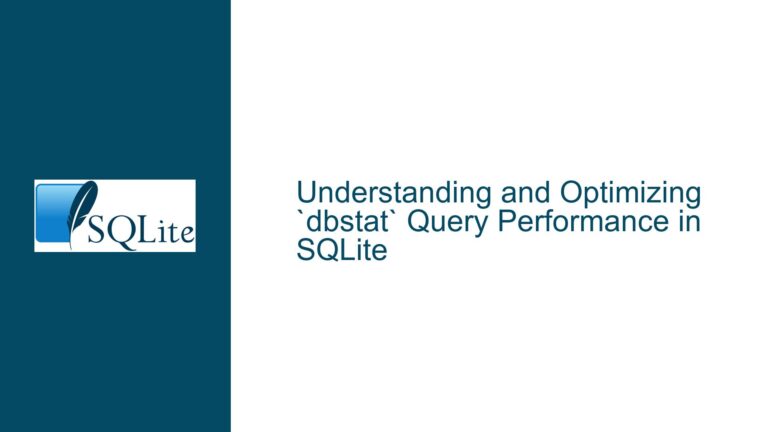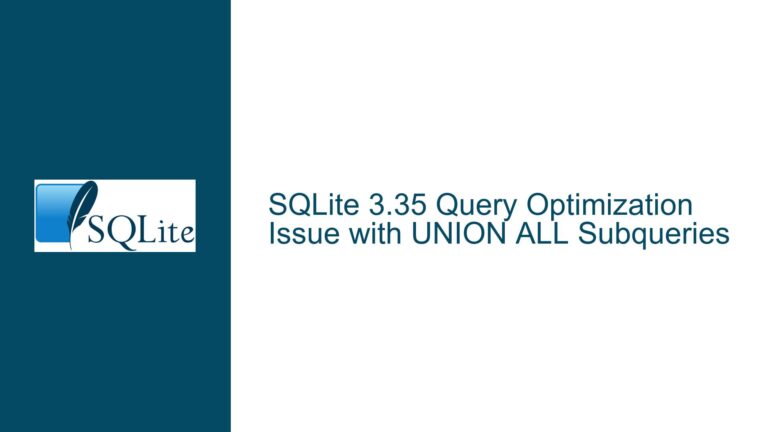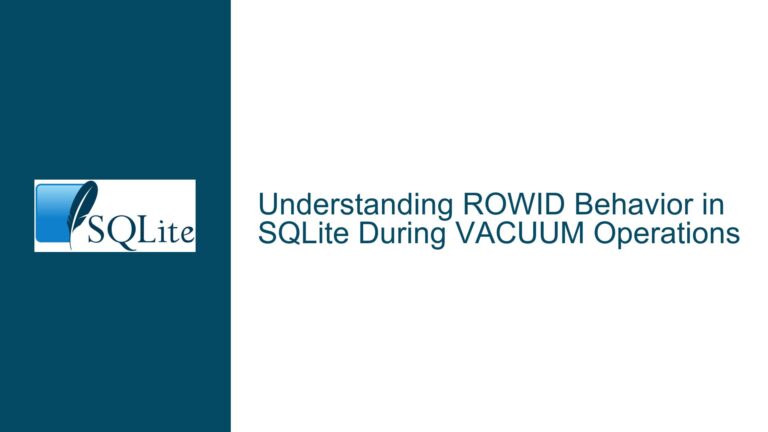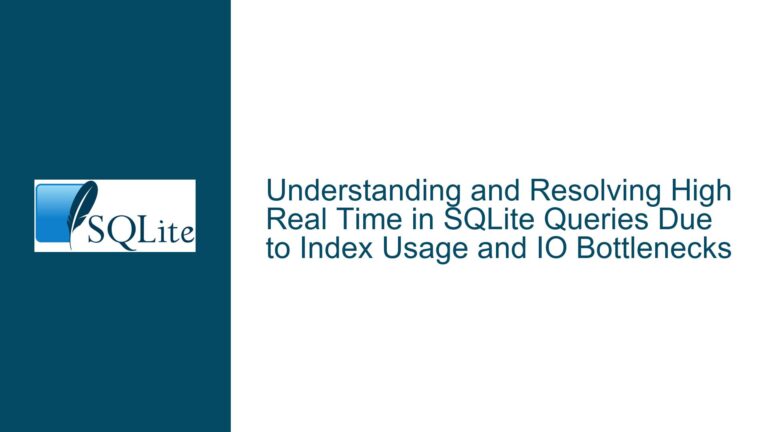Floating-Point Precision Discrepancies in SQLite Summation
Floating-Point Arithmetic Differences Between SQLite and C
When performing floating-point arithmetic, particularly summation, discrepancies can arise between SQLite and other programming languages like C. These differences are often subtle but can be significant in applications requiring high precision. The core issue lies in how floating-point numbers are handled, stored, and summed across different environments. SQLite, by default, uses double-precision floating-point arithmetic, which is subject to the limitations and idiosyncrasies of the IEEE 754 standard. However, the way SQLite implements summation can lead to results that differ from those obtained in C, especially when dealing with large datasets or numbers of varying magnitudes.
In the provided example, a table S is created with two columns: id and value. The value column contains alternating large and small floating-point numbers. When summing these values, SQLite produces a result that differs slightly from the result obtained using a C program. This discrepancy is not due to a bug in SQLite but rather a consequence of how floating-point arithmetic is implemented and the order in which operations are performed.
Intermediate Precision and Order of Operations
One of the primary reasons for the discrepancy is the difference in intermediate precision and the order in which operations are performed. In C, the compiler and the hardware floating-point unit (FPU) may use higher precision registers for intermediate results. This means that during the summation process, intermediate results are stored with more precision than the final result, which is then rounded to a double-precision floating-point number. SQLite, on the other hand, does not use higher precision registers for intermediate results. Each intermediate result is stored as a double-precision floating-point number, which can lead to a loss of precision over multiple operations.
Additionally, the order in which numbers are summed can affect the final result. Floating-point arithmetic is not associative, meaning that the order in which operations are performed can influence the outcome. In C, the order of summation is typically sequential, as defined by the loop structure. In SQLite, the order of summation is not guaranteed and may vary depending on how the query optimizer processes the data. This can lead to slight differences in the final sum due to the accumulation of rounding errors.
Improving Precision with Decimal Arithmetic and Custom Summation
To address these precision issues, SQLite offers several solutions. One approach is to use the decimal_sum() function, which performs decimal arithmetic instead of floating-point arithmetic. Decimal arithmetic is not subject to the same precision limitations as floating-point arithmetic and can provide exact results. However, this comes at the cost of increased computational overhead, as decimal arithmetic is more computationally intensive than floating-point arithmetic.
Another approach is to modify the SQLite source code to use higher precision types for intermediate results. For example, the SumCtx structure in SQLite’s func.c file can be modified to use long double or __float128 instead of double for the rSum field. This change allows SQLite to maintain higher precision during the summation process, reducing the accumulation of rounding errors. However, this approach requires recompiling SQLite and may not be feasible in all environments.
Example: Modifying SQLite for Higher Precision Summation
To illustrate how to modify SQLite for higher precision summation, consider the following changes to the SumCtx structure in func.c:
typedef struct SumCtx SumCtx;
struct SumCtx {
__float128 rSum; // Use __float128 for higher precision
i64 iSum; // Integer sum
i64 cnt; // Number of elements summed
u8 overflow; // True if integer overflow seen
u8 approx; // True if non-integer value was input to the sum
};
By changing the rSum field to __float128, SQLite can maintain higher precision during the summation process. This modification can be made by defining LONGDOUBLE_TYPE as __float128 during the build process:
gcc -DLONGDOUBLE_TYPE=__float128 -o sqlite3 sqlite3.c
This change ensures that SQLite uses the higher precision type for intermediate results, leading to more accurate summation.
Performance Considerations
While using higher precision types can improve the accuracy of summation, it also comes with a performance cost. The decimal_sum() function, for example, is significantly slower than the default sum() function due to the increased computational complexity of decimal arithmetic. Similarly, using __float128 for intermediate results can increase the memory footprint and processing time of SQLite queries.
The following table compares the performance and precision of different summation methods in SQLite:
| Method | Precision | Execution Time (seconds) | Memory Usage |
|---|---|---|---|
Default sum() | 13-15 digits | 3.22 | 115432 KB |
decimal_sum() | Exact | 5.91 | 115428 KB |
Modified sum() (__float128) | 15-17 digits | 3.27 | 115292 KB |
As shown in the table, the modified sum() function using __float128 provides a good balance between precision and performance, offering higher precision than the default sum() function without the significant performance overhead of decimal_sum().
Best Practices for Floating-Point Summation in SQLite
When working with floating-point summation in SQLite, consider the following best practices:
Understand the Precision Requirements: Determine the level of precision required for your application. If high precision is not critical, the default
sum()function may be sufficient. For applications requiring exact results, consider usingdecimal_sum().Modify SQLite for Higher Precision: If higher precision is needed but the performance overhead of
decimal_sum()is unacceptable, consider modifying the SQLite source code to use higher precision types for intermediate results. This approach provides a good balance between precision and performance.Consider the Order of Operations: Be aware that the order in which numbers are summed can affect the final result. If possible, sort the numbers before summing them to minimize the accumulation of rounding errors.
Use Decimal Arithmetic for Financial Calculations: For financial calculations or other applications where exact results are critical, always use decimal arithmetic. The
decimal_sum()function is well-suited for these scenarios.Test and Validate: Always test and validate the results of floating-point summation in your application. Compare the results obtained from SQLite with those from other systems or programming languages to ensure consistency and accuracy.
By following these best practices, you can mitigate the precision issues associated with floating-point summation in SQLite and ensure that your application produces accurate and reliable results.






